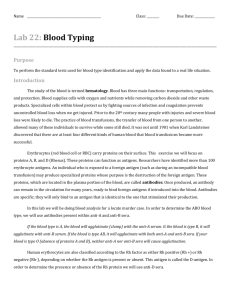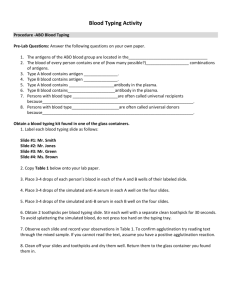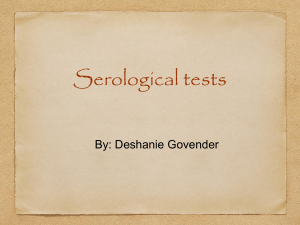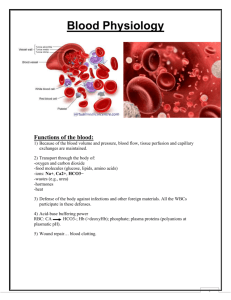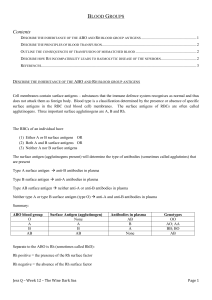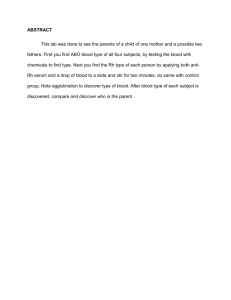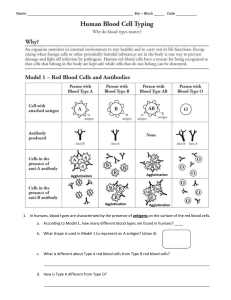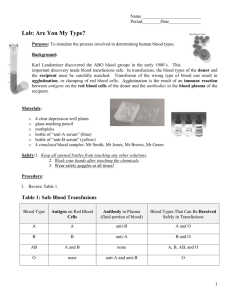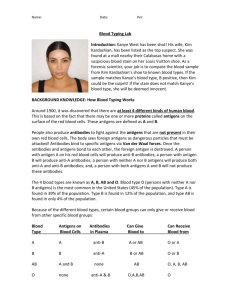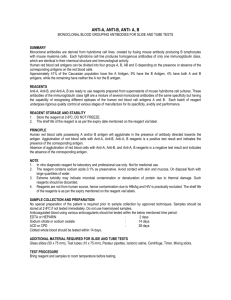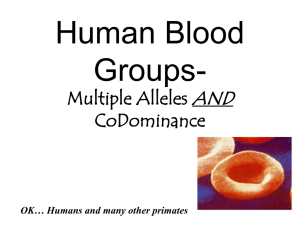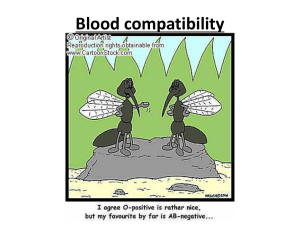14.3 Blood Groups and Transfusions
advertisement
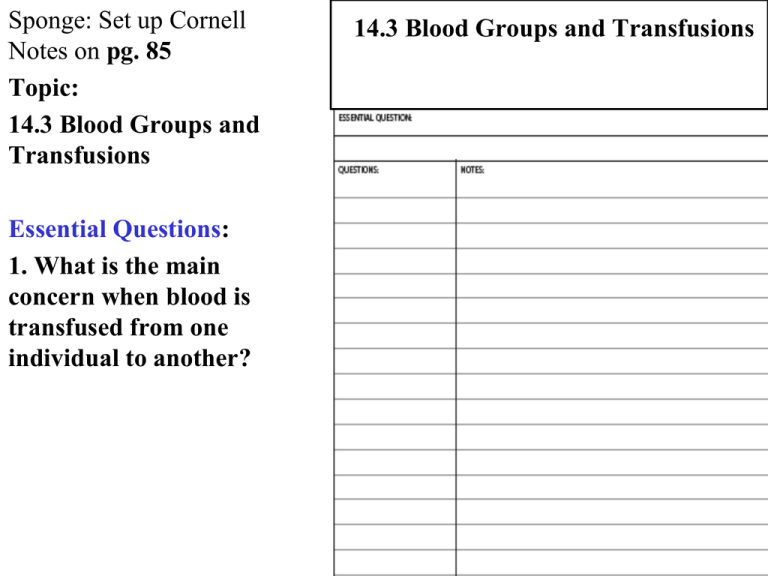
Sponge: Set up Cornell Notes on pg. 85 Topic: 14.3 Blood Groups and Transfusions Essential Questions: 1. What is the main concern when blood is transfused from one individual to another? 14.3 Blood Groups and Transfusions 2.1 Atoms, Ions, and Molecules • In the 1800’s human blood was being used for blood transfusions (earlier animal blood was used) • Results were very unpredictable • Some people were cured • But many were killed • The success rate was so poor, many nations banned transfusions Karl Landsteiner: • Began investigating why some blood transfusions work, and some do not • In 1900, he determined that blood was of differing types and that only certain combinations of them were compatible • By 1910, the identification of the ABO blood antigen gen explained the observed blood type incompatibilities Blood Transfusions (2m8s) Antigens and Antibodies • Agglutination: the clumping of red blood cells resulting from a transfusion reaction • May result in death Symptoms • Anxiety • Breathing difficulty • Facial flushing • Headache • Severe pain in head/neck/back • RBCs burst • Jaundice • Kidneys fail resulting in death 5 Agglutination 6 Antigens: RBC surface molecules Antibodies: proteins carried in the blood’s plasma Called “anti” because they are “against” specific antigens Avoiding the mixture of certain kinds of antigens and 7 antibodies prevents agglutination ABO Blood Group ABO Blood Group: Based on the presence or absence of two major antigens on red blood cell membranes • antigen A • antigen B 8 Type A Blood Contains: Antigen A Anti-B Antibody • Will clot in the presence of Anti-A Antibody 9 Type B Blood Contains: Antigen B Anti-A Antibody • Will clot in the presence of Anti-B Antibody 10 Type AB Blood Contains: Antigen A Antigen B No Antibodies • Will clot in the presence of Anti-A or Anti-B Antibody 11 Type O Blood Contains: No Antigens Anti-A Antibody Anti-B Antibody • Will not clot in the presence of Anti-A or Anti-B Antibody 12 Blood Types: Antigens and Antibodies 13 ABO Blood Group 14 Universal Donor: If a blood type lacks antigens, it can theoretically be transfused into persons with any other type of blood • Which type of blood is considered the “universal donor”? • Type O Universal Recipient: If a blood type lacks antibodies, it can theoretically receive blood from any other type of blood • Which type of blood is considered the “recipient”? • Type AB BUT…It is always best to use donor blood of the same type for transfusions!!!!! 15 Blood Types for Transfusion 16 Rh Blood Group Rh positive: presence of antigen D or and other Rh antigens on the red blood cell membranes • Can receive Rh+ or Rh- blood Rh negative: lack of antigen D or Rh antigens • Can only receive Rh- blood 17 18 19 Erythroblastosis Fetalis: A condition when an Rh- woman is pregnant with an Rh+ fetus • • • First pregnancy might be uneventful At birth- infants blood may mix with mothers causing her to produce anti-Rh antibodies Second Rh+ pregnancy: mother’s anti-Rh antibodies may attack fetal red cells causing possible miscarriage, brain damage, or death 20 The Blood Typing Game http://www.nobelprize.org/educational/med icine/bloodtypinggame/ Or Google: Nobel Prize Blood Typing Game 21 Blood Typing Lab Objective: The students will determine the ABO/Rh antigens present in unknown blood samples and learn the importance of blood types and blood typing to transfusions and the immune response Problem: Mr. Walker is brought into the emergency room after a car accident. He is in need of a blood transfusion. He has type A blood. There are four donors available. Based on the antigens and antibodies in the blood for Mr. Walker and the donors, determine from whom Mr. Walker can safely receive a transfusion. 22 Blood Typing Lab Directions • Follow the directions on your Procedure paper for each of the two lab activities. • Use the Ward’s Blood Typing Poster to help you analyze your results 23 Type A Blood: (Antigen A) Anti-A: agglutination (+) Anti-B: no agglutination (-) Type B Blood (Antigen B) Anti-A: no agglutination (+) Anti-B: agglutination (-) Type AB Blood: (Antigen A &B) Anti-A: agglutination (+) Anti-B: agglutination (-) Type O Blood: No Antigens Anti-A: no agglutination (+) Anti-B: no agglutination (-) Rh Factor: Antigen D or Rh Antigens Anti-Rh: Rh+:agglutination Rh-: no agglutination 25
